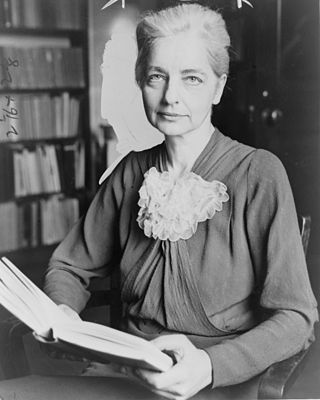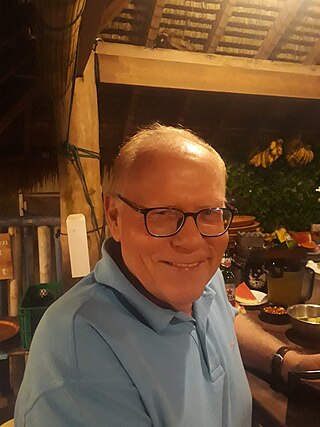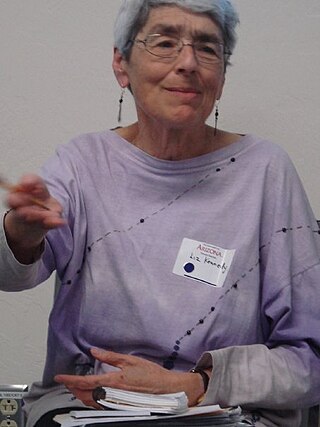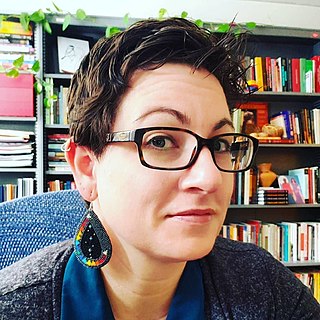Related Research Articles

Ruth Fulton Benedict was an American anthropologist and folklorist.

Gayle S. Rubin is an American cultural anthropologist, theorist and activist, best known for her pioneering work in feminist theory and queer studies.
Feminist anthropology is a four-field approach to anthropology that seeks to transform research findings, anthropological hiring practices, and the scholarly production of knowledge, using insights from feminist theory. Simultaneously, feminist anthropology challenges essentialist feminist theories developed in Europe and America. While feminists practiced cultural anthropology since its inception, it was not until the 1970s that feminist anthropology was formally recognized as a subdiscipline of anthropology. Since then, it has developed its own subsection of the American Anthropological Association – the Association for Feminist Anthropology – and its own publication, Feminist Anthropology. Their former journal Voices is now defunct.

Gilbert H. Herdt is Emeritus Professor of Human Sexuality Studies and Anthropology and a Founder of the Department of Sexuality Studies and National Sexuality Resource Center at San Francisco State University. He founded the Summer Institute on Sexuality and Society at the University of Amsterdam (1996). He founded the PhD Program in Human Sexuality at the California Institute for Integral Studies, San Francisco (2013). He conducted long term field work among the Sambia people of Papua New Guinea, and has written widely on the nature and variation in human sexual expression in Papua New Guinea, Melanesia, and across culture.
John H. Gagnon was a pioneering sociologist of human sexuality who wrote and edited 15 books and over 100 articles. He collaborated with William Simon to develop the piece he is perhaps best recognized for: "Sexual Conduct: The Social Sources of Human Sexuality" (1973). He was Distinguished Emeritus Professor of Sociology at the State University of New York at Stony Brook, where he taught and from 1968 to 1998. In that same time frame, he also dedicated himself to advancing the field of sociology through his research.
Stephen O. Murray was an American anthropologist, sociologist, and independent scholar based in San Francisco, California. He was known for extensive scholarly work on the sociology, anthropology, and comparative history of sexual and gender minorities, on sociolinguistics, history of the social sciences, and as an important editor and organizer of scholarly work in these areas.
Esther Newton is an American cultural anthropologist who did pioneering work on the ethnography of lesbian and gay communities in the United States.
Tom Boellstorff is an anthropologist based at the University of California, Irvine. In his career to date, his interests have included the anthropology of sexuality, the anthropology of globalization, digital anthropology, Southeast Asian studies, the anthropology of HIV/AIDS, and linguistic anthropology.

Elizabeth Lapovsky Kennedy was one of the founding feminists of the field of women's studies and is a lesbian historian whose book Boots of Leather, Slippers of Gold: A History of the Lesbian Community documents the lesbian community of Buffalo, New York, in the decades before Stonewall.
William Leap is an emeritus professor of anthropology at American University and an affiliate professor in the Women's, Gender and Sexuality Studies Program at Florida Atlantic University. He works in the overlapping fields of language and sexuality studies and queer linguistics, and queer historical linguistics.
Roger Lancaster is a professor of anthropology and cultural studies at George Mason University in Fairfax, Virginia, where from 1999 until 2014 he directed the Cultural Studies PhD Program. He is known for his writing in LGBT studies, gender/sexuality, culture and political economy, and critical science studies. His research tries to understand how sexual mores, racial hierarchies, and class predicaments interact in a changing world.
Ana-Maurine Lara is a Dominican American lesbian poet, novelist and black feminist scholar.
Barbara L. Voss is an American historical archaeologist. Her work focuses on cross-cultural encounters, particularly the Spanish colonization of the Americas and Overseas Chinese communities in the 19th century, as well as queer theory in archaeology and gender archaeology. She is an associate professor of anthropology at Stanford University.
Linda Louise Layne is an American anthropologist. She is a visiting fellow at the University of Cambridge in the Reproductive Sociology Research Group (ReproSoc). Her first book was on tribal and national identities in the Hashemite Kingdom of Jordan.
The Ruth Benedict Prize is an award given annually by the American Anthropological Association's "to acknowledge excellence in a scholarly book written from an anthropological perspective about a lesbian, gay, bisexual, or transgender topic". The award was established in 1986 in honor of anthropologist, Ruth Benedict (1887–1948) and is given in two separate categories: a monograph by a single author and an edited volume.
Kath Weston is an American anthropologist, author and academic. She is a Guggenheim Fellow and has twice received the Ruth Benedict Prize for anthropological works.

Jenny L. Davis is an American linguist, anthropologist, and poet. She is an Associate Professor of Anthropology, American Indian Studies, and Gender & Women's Studies at the University of Illinois at Urbana–Champaign where she is the director of the American Indian Studies Program. Her research is on contemporary Indigenous languages and identity, focusing on Indigenous language revitalization and Indigenous gender and sexuality, especially within the Two-Spirit movement.
Arlene Stein is an American sociologist and author best known for her writing about sex and gender, the politics of identities, and collective memory. She is Distinguished professor of sociology at Rutgers University where she directs the Rutgers University Institute for Research on Women. Stein has also taught at the University of Essex and at the University of Oregon.
Lucinda Ramberg is an American anthropologist whose work focuses on gender, sexuality, religion and health. She was awarded multiple prizes in 2015 for her first book, Given to the Goddess: South Indian Devadasis and the Sexuality of Religion. Ramberg is associate professor in anthropology and director of graduate studies in the Feminist, Gender, and Sexuality Studies program at Cornell University.
Evelyn Blackwood is an American anthropologist whose research focuses on gender, sexuality, identity, and kinship. She was awarded the Ruth Benedict Prize in 1999, 2007 and 2011. Blackwood is an emerita professor of anthropology at Purdue University.
References
- ↑ Lewin, Ellen (1996). "Confessions of a Reformed Grant Hustler". In Lewin, Ellen; Leap, William L. (eds.). Out in the Field: Reflections of Lesbian and Gay Anthropologists. University of Illinois Press. ISBN 9780252065187.
- 1 2 "Ellen Lewin | Gender, Women's & Sexuality Studies | College of Liberal Arts & Sciences | The University of Iowa". clas.uiowa.edu. Retrieved 2017-05-15.
- ↑ "The Ruth Benedict Prize". The Association for Queer Anthropology. Retrieved 9 June 2019.